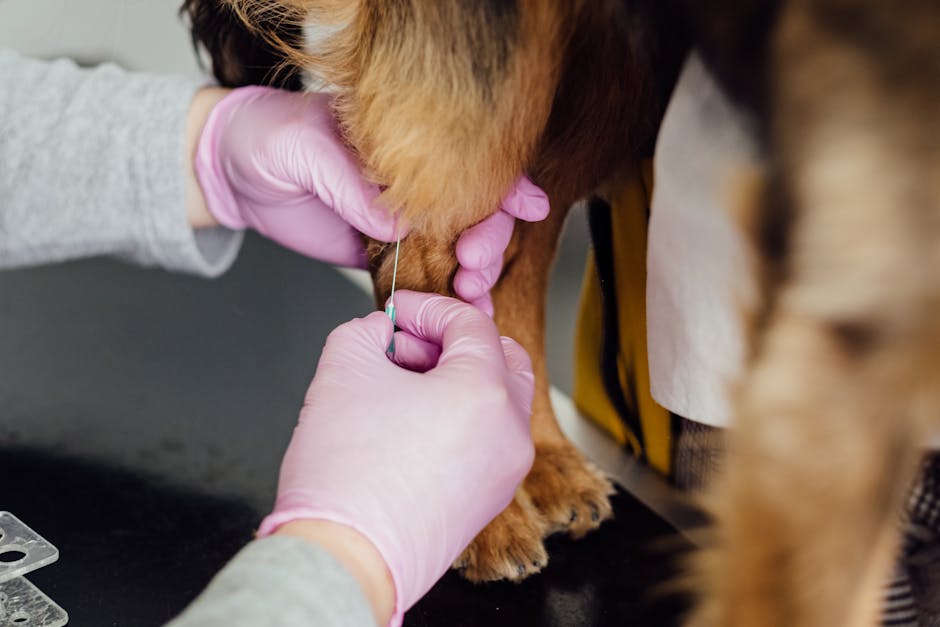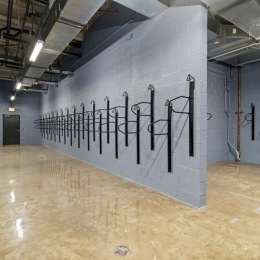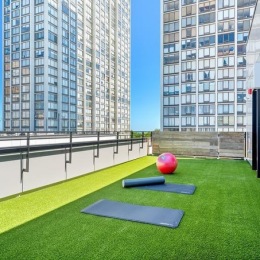Finding a Home for You and Your Furry Friend
Looking for an apartment rental that takes dogs? Here's a quick guide to help you in your search:
- Use specialized filters on rental websites like Zillow, Apartments.com, or Rentable
- Prepare a pet resume with vaccination records, training certificates, and references
- Budget for pet fees which typically include deposits and possible monthly pet rent
- Check for breed or size restrictions before applying
- Get all pet agreements in writing before signing a lease
Finding a place to call home can be challenging, and when you add a four-legged family member to the equation, the search becomes even more complex. With an estimated 72% of renters having pets, yet many landlords still hesitant to welcome them, the competition for quality dog-friendly apartments can be fierce.
The good news is that the rental market is evolving. In major cities like Chicago, Los Angeles, and San Francisco, more than half of available rental units now allow pets. This shift reflects growing recognition that pet owners often make excellent, stable tenants who stay longer in their homes.
Why is the search still difficult? Many property owners worry about potential damage, noise complaints, or insurance complications. Some impose breed or weight restrictions, while others add substantial fees or deposits to offset perceived risks.
But don't be discouraged. With the right approach and preparation, you can find a wonderful home where both you and your dog will be welcome. The key is knowing where to look, understanding what to expect regarding policies and costs, and presenting yourself as a responsible pet parent.

How Common Is an Apartment Rental That Takes Dogs?
The pet-friendly rental landscape is evolving—and that's great news for dog owners. According to the Pet-Inclusive Housing Research Report, about 72% of renters have pets, creating a substantial demand for accommodations that welcome four-legged family members.
If you're searching in major cities like Chicago, Los Angeles, or San Francisco, you'll be pleased to know that more than half of available rental units now allow pets in some capacity. This shift isn't just coincidence—property managers are increasingly recognizing that pet-friendly policies attract reliable, long-term tenants who tend to renew their leases.
For dog parents specifically, the National Dog Inclusive Rental Database has become a game-changing resource. This comprehensive catalog focuses on properties that genuinely welcome dogs—featuring rentals that either have no breed restrictions, accept larger dogs over 60-70 pounds, or offer alternative approval processes.
Despite these positive trends, the reality remains challenging. The same research found that 72% of pet owners report that finding apartment rentals that take dogs is still difficult. This gap between pet-owning renters and truly pet-friendly units highlights a painful truth: many beloved pets are surrendered to shelters each year simply because their families cannot find accommodations that welcome them.
Why Supply Still Lags Behind Demand
What's keeping landlords hesitant about welcoming your furry friend? Several key factors come into play:
Insurance complications create significant barriers. Many property insurance policies either exclude certain breeds entirely or charge substantially higher premiums for buildings that allow dogs. Insurance companies often maintain "dangerous breed" lists that might include popular and well-loved breeds like German Shepherds, Dobermans, Rottweilers, and pit bull-type dogs.
Liability concerns keep many property owners awake at night. The worry that they might be legally responsible if a tenant's dog injures someone on the property often leads to blanket no-pet policies rather than evaluating each dog and owner on their own merits.
Property damage myths persist despite contrary evidence. Many landlords believe dogs inevitably cause significant damage, though research suggests responsible pet owners typically cause no more wear and tear than pet-free tenants. In fact, pet owners typically stay in rentals 23-46 months compared to just 18 months for non-pet renters—significantly reducing costly turnover expenses.
The good news? These perceptions are gradually shifting as more data becomes available showing the benefits of pet-friendly policies. Forward-thinking property managers are finding that welcoming pets with thoughtful policies can actually protect their investment while meeting market demand—creating win-win situations for both landlords and dog owners.
The Biggest Roadblocks & Smart Fixes
Looking for an apartment rental that takes dogs can feel like searching for a needle in a haystack. But don't worry—understanding the common obstacles ahead of time can make your search much smoother.
Breed & Size Restrictions—Navigating the Fine Print
That sinking feeling when you see "Dogs under 25 pounds only" or "No restricted breeds" is all too familiar for many pet parents. These limitations typically stem from the property's insurance requirements rather than the manager's personal feelings about your furry friend.

Fortunately, there are ways around these frustrating barriers. Looking for breed-neutral properties through specialized databases can save you time and heartache. The National Dog Inclusive Rental Database specifically highlights properties that don't discriminate based on breed or that welcome larger dogs over 60-70 pounds.
Another approach is to offer your own insurance solution. Some landlords will reconsider their stance if you purchase dog liability insurance. Companies like State Farm often don't maintain breed restriction lists for their renters' insurance policies.
Advocacy groups can be your best allies in this search. Organizations like "My Pit Bull is Family" maintain databases across 22 states connecting renters with truly inclusive housing options. Sometimes, demonstrating your dog's good behavior through training certificates or arranging a meet-and-greet can make all the difference.
As one Chicago tenant shared: "The property manager was hesitant about my 70-pound Lab mix at first. After bringing him for a meet-and-greet and showing his training certificates, they completely changed their mind. We got approved the very next day!"
Money Matters: Budgeting for Fido
The financial side of pet-friendly housing can catch many renters by surprise. These costs should be factored into your housing budget from the start.
Pet deposits typically range from 40% to 85% of one month's rent ($200-$500 nationally) and may be refundable if your pup doesn't damage anything. Unlike deposits, pet fees are one-time, non-refundable charges in a similar price range. Then there's monthly pet rent—an additional $50 to $100 tacked onto your regular rent payment each month.
Before you get discouraged by these figures, know that there are ways to manage these costs. Researching local regulations is crucial, as some areas limit how much landlords can charge for pet fees. Don't be afraid to negotiate payment plans to spread out upfront costs, or suggest a higher security deposit instead of ongoing pet rent.
Demonstrating responsibility through vet records, training certificates, and previous landlord references can sometimes help you negotiate better terms. Property managers are often more flexible with tenants who can prove they're responsible pet owners.

These financial problems, while frustrating, are simply part of the process. With some planning and persistence, you'll find a place where both you and your four-legged family member can feel right at home.
Finding an "Apartment Rental That Takes Dogs" Step-by-Step
The hunt for a pet-friendly apartment doesn't have to feel like searching for a needle in a haystack. With some strategic planning and insider knowledge, you and your furry friend can find the perfect place to call home. Here's how to tackle your search efficiently:
Online Tactics to Locate an Apartment Rental That Takes Dogs
The digital world offers powerful tools to streamline your search for apartment rentals that take dogs. Start by leveraging specialized filters on major rental platforms like Zillow, Apartments.com, and Rentable. These filters let you immediately narrow your search to pet-friendly options, saving you valuable time.
Don't stop at mainstream sites, though. Targeted resources like the Humane Society's "Pets Are Welcome" database and "My Pit Bull is Family" housing directory specifically cater to dog owners facing breed or size restrictions. These specialized platforms often reveal hidden gems that mainstream sites might miss.
Setting up personalized alerts can be a game-changer in competitive markets. Create saved searches with your specific criteria and sign up for email notifications. When that perfect dog-friendly unit becomes available, you'll be among the first to know—giving you a crucial advantage in tight rental markets.
Reading between the lines of listings is equally important. Even within buildings labeled "pet-friendly," policies can vary dramatically. Some may welcome small dogs but restrict larger breeds, while others might have specific floor restrictions or designated pet areas. Pay close attention to the fine print about size limitations or breed restrictions.
Pro tip: Try searching for amenities like "dog park," "pet spa," or "dog washing station" to find buildings that don't just tolerate dogs—they celebrate them with special features designed for pet owners.
A happy renter in Edgewater shared: "I set up alerts on three different websites with my specific criteria—two-bedroom, under my budget, and dog-friendly. When The Heron Apartments popped up with their pet amenities, I applied immediately. Having the dog wash station on-site has been a game-changer for my muddy retriever!"
Offline Hacks & Networking
While online searches provide convenience, some of the best pet-friendly apartments never make it to listing sites. That's where old-fashioned networking comes into play.
Local real estate agents often have insider knowledge about which buildings and management companies genuinely welcome pets versus those that merely tolerate them. A good agent can save you hours of research by steering you toward truly dog-friendly options from the start.
Your existing pet-care network can be a goldmine of housing leads. Veterinarians, dog trainers, and groomers hear about pet-friendly housing options from their clients and may maintain informal lists of recommendations. Don't be shy about asking these professionals for suggestions during your next visit.
Animal rescue organizations have a vested interest in keeping pets in homes. Many maintain resources for pet-friendly housing to prevent surrenders due to housing issues. Reaching out to these groups can connect you with options that prioritize inclusivity for all breeds and sizes.

Perhaps the most enjoyable research method is simply walking your target neighborhoods with your dog. Strike up conversations with other dog owners you meet—they'll often gladly share insights about which buildings truly welcome four-legged residents. These candid conversations can reveal which properties have the most dog-friendly cultures, not just policies.
Community dog events provide another natural networking opportunity. Dog parks, pet-friendly festivals, and adoption events gather like-minded dog owners who can share their housing experiences and leads on available units.
As one Chicago resident finded: "I found my current apartment by striking up a conversation at the dog park. Another dog owner mentioned their building had a vacancy, and they loved how pet-friendly the management was. I called that day and ended up with a much better place than anything I'd found online."
This combination of digital savvy and personal connections gives you the best chance of finding not just an apartment rental that takes dogs, but one where both you and your furry family member will truly feel at home.
Crafting a Winning Pet Resume & Application Packet
Let's face it—when you're competing for an apartment rental that takes dogs, you need every advantage you can get. One of the most powerful tools in your arsenal? A professional pet resume that transforms your furry friend from a potential liability into an ideal tenant.
Think of your pet resume as your dog's professional headshot and LinkedIn profile combined. It shows property managers that you take pet ownership seriously and helps them picture your pup as a well-behaved community member rather than a risk.

A standout pet resume should include your dog's basics—name, age, breed or mix, weight, and how long you've been together. Add a charming (but not overly energetic) photo of your well-groomed companion looking their Sunday best. Document any training credentials, especially that coveted Canine Good Citizen certification that makes property managers breathe easier.
"The pet resume was a game-changer for us," shares a Chicago renter. "When I attached professional-looking documents about my shepherd mix to our application, the property manager actually called to tell me how impressed they were. We got approved within 24 hours!"
Don't forget to outline your dog's daily routine, showing they won't be left alone to bark for hours, and include vet records proving they're healthy and up-to-date on preventative care. A few solid references—previous landlords, your vet, even dog walkers—can make all the difference.
Meet-and-Greet Etiquette With Landlords
If you score a face-to-face meeting with a potential landlord, think of it as your dog's job interview. A little preparation goes a long way:
Arrive with a freshly groomed, moderately exercised pup—you want calm energy, not post-dog-park zoomies. Skip the retractable leash (property managers see those as red flags) and opt for a standard leash that shows you're in control.
Without turning it into a circus act, quietly demonstrate that your dog responds to basic commands. When your potential landlord sees your dog sit calmly or come when called, they're mentally checking boxes in your favor.
Bring your documentation portfolio and be refreshingly honest about any quirks your dog might have. Explaining how you manage the occasional barking when delivery trucks arrive shows you're aware and proactive.
"I always suggest offering an additional security deposit during these meetings," advises a long-time Chicago property manager. "It shows confidence in your pet's behavior and often makes the difference between approval and rejection."
Letters & Documents That Seal the Deal
Support your application with professional endorsements that carry serious weight:
A letter from your veterinarian does double-duty, confirming both your dog's health and your responsibility as an owner. Similarly, a note from a trainer who's worked with your dog provides third-party validation of good behavior.
Previous landlord recommendations are pure gold. When a property manager reads that your dog has already lived successfully in a rental without incident, their perceived risk drops dramatically.
Include proof of renters insurance with pet liability coverage—this directly addresses one of landlords' biggest concerns. Top it off with a signed pledge outlining your commitment to noise control, waste management, and prompt attention to any issues.
These documents aren't just paperwork—they're peace of mind for property managers who want to say yes but need reassurance. With a professional application packet in hand, you'll stand out among dozens of applicants vying for that perfect apartment rental that takes dogs.
Decoding Lease Terms, Rights & Negotiation Tips
When you finally find that perfect apartment rental that takes dogs, the paperwork might feel like the last hurdle—but it's actually one of the most important parts of the process. Understanding what you're signing and knowing how to advocate for yourself and your furry friend can make all the difference in your renting experience.
Spotting Loopholes Before You Sign
The excitement of finding a pet-friendly place can sometimes cloud our judgment when reviewing lease terms. Take your time to look for these potential issues:
Contradictory language is surprisingly common in lease agreements. Many standard leases contain a blanket "no pets" clause, with a separate pet addendum tacked on. Make sure these documents don't conflict, and that the addendum clearly overrides any contradictory terms in the main lease.
"My landlord told me my dog was welcome, but when I got the lease, it said 'no pets allowed,'" shares a Chicago renter. "When I pointed this out, he said 'Oh, we'll add a pet addendum later.' I refused to sign until that addendum was created and attached to the original lease. That saved me from potential problems down the road."
Verbal promises don't hold up in court! If your property manager smiles and says "Your Labrador is welcome here" but hands you a lease that says otherwise, pump the brakes. Get all permissions in writing before signing anything.
Watch for vague wording that leaves too much to interpretation. Terms like "pets may be allowed with approval" or "management reserves the right to revoke pet privileges" create uncertainty about your rights. Seek clarity on these points before committing.
Hidden conditions can also cause headaches later. Some leases include provisions allowing the landlord to change pet policies upon renewal or charge additional fees if neighbors complain. Understanding these details upfront helps you avoid surprises later.
Verifying an Apartment Rental That Takes Dogs in Writing
When it comes to pet policies, documentation is your best friend. Here's how to ensure everything is properly recorded:
A comprehensive pet addendum should be your goal. This document should specifically identify your dog by name, breed, and weight, and clearly outline all related policies. Both you and the landlord should sign and date this document.
Take screenshots of pet-friendly listings if you found the apartment online. That "dog-friendly" filter that led you to the property? Save evidence of it. If questions arise later, you'll have proof of how the property was marketed.
Email confirmations serve as excellent documentation. After in-person conversations about your pet, send a follow-up email summarizing what was discussed. Something like: "As we discussed today, my 65-pound Golden Retriever will be living with me, with a pet deposit of $400." If the landlord replies affirmatively, you've created a paper trail.
Be especially diligent about documenting any special accommodations. If you've received an exception to a weight limit or breed restriction, make sure that exception is explicitly stated in writing and attached to your lease.

When negotiating with landlords, a thoughtful approach often yields the best results. Instead of demanding exceptions, try framing your requests as solutions to their concerns. Offering to introduce your dog shows confidence in their behavior and gives the landlord a chance to see beyond stereotypes. Proposing a trial period demonstrates your understanding of their hesitation while giving your pet a chance to prove themselves.
Additional insurance coverage can address liability concerns directly. Many landlords worry about potential legal issues, so coming prepared with information about your policy can ease their minds. Similarly, highlighting your dog's training credentials transforms your pet from a potential liability to a model tenant.
When a property manager expresses specific concerns, address them directly. If noise is the worry, explain your dog's typical behavior and your management strategies. If property damage is the issue, discuss your dog's house-training and your commitment to regular maintenance.
Service animals and emotional support animals have special protections under fair housing laws. These animals aren't classified as "pets," and landlords generally cannot apply standard pet restrictions or fees to them. However, proper documentation may still be required, so be prepared to provide it if needed.
With clear communication, proper documentation, and a bit of negotiation skill, you can steer the lease-signing process successfully and create a solid foundation for a positive landlord-tenant relationship—for both you and your four-legged roommate.
Happy, Harmonious Living With Your Dog
Found your perfect apartment rental that takes dogs? Congratulations! Now comes the fun part—creating a peaceful, happy home for both you and your four-legged roommate. Living harmoniously in an apartment with a dog takes some planning, but the rewards of having your best friend with you are immeasurable.
Daily exercise is absolutely essential for apartment dogs. A tired pup is a well-behaved pup! Take advantage of Chicago's gorgeous lakefront trails and neighborhood parks for regular walks and play sessions. Your dog will be less likely to develop nuisance behaviors like excessive barking or furniture chewing when they're properly exercised and mentally stimulated.
Managing noise should be a top priority in apartment living. Even the most patient neighbors have their limits when it comes to persistent barking. If your dog struggles with separation anxiety, consider solutions like a midday dog walker, interactive puzzle toys, or even doggy daycare a few days a week. Many dog owners find that leaving the TV or radio on provides comforting background noise that helps keep their pets calm.
Cleanliness becomes even more important in smaller spaces. Regular grooming sessions will minimize shedding and odors, while prompt cleanup of any accidents prevents stains and lingering smells. A clean apartment makes for happier neighbors and property managers—not to mention a more pleasant living environment for you!
Before bringing your dog home, take time to dog-proof your space. Secure loose wires, remove toxic plants, and consider furniture covers for expensive pieces. Creating a designated dog zone with your pet's bed, toys, and water dish gives them a sense of security and routine in their new environment.

Building Community Goodwill
Being a model dog owner in your building creates positive relationships that make apartment living more enjoyable for everyone. Small courtesies go a long way toward building goodwill with neighbors and staff.
Elevator etiquette matters enormously in apartment buildings. Keep your dog close to you, always ask before allowing others to pet them, and consider taking the stairs during busy times if your pup gets overly excited around strangers. If your dog is still learning manners, a short training session before entering common areas can help them stay calm.
Always carry extra waste bags on walks—nothing damages community relations faster than a dog owner who doesn't clean up! This simple habit shows respect for shared spaces and your neighbors.
Take time to properly introduce your dog to neighbors and their pets through controlled, positive interactions. These connections not only socialize your dog but can lead to helpful arrangements like reciprocal pet-sitting or walking.
Showing appreciation to building staff who accommodate your pet creates valuable allies. A small holiday gift or thank-you note to maintenance staff who've helped with pet-related issues builds goodwill that may come in handy later.
Many pet-friendly buildings host community events like "yappy hours" or pet-themed gatherings. Participating helps integrate your dog into the community and builds a support network of fellow pet owners who understand the joys and challenges of apartment living with dogs.
Preventing Damage & Getting Your Deposit Back
Smart prevention strategies protect both your security deposit and your relationship with property management.
Proper training is your best investment. Basic obedience and crate training provide structure and prevent destructive behaviors when you're away. Even older dogs can benefit from refresher training when moving to a new environment.
Maintain regular nail trims to prevent scratched floors and damaged carpets. If your dog resists nail trims, gradually desensitize them to the process or schedule regular professional grooming appointments.
Establish a consistent cleaning schedule that includes regular vacuuming, spot-cleaning, and deep cleaning to prevent buildup of hair and odors. The right cleaning products make a huge difference—look for enzymatic cleaners specifically designed for pet messes.
If your dog does cause damage, address issues immediately. Report it promptly to management and offer to handle repairs rather than waiting until move-out when charges might be higher. This transparency builds trust with your property manager.
When you first move in, document any pre-existing conditions with dated photos to avoid being charged for damage you didn't cause. This simple step can save hundreds of dollars when it's time to move out.
A resident at The Heron shared: "The on-site dog wash station has been incredible for keeping my apartment clean. After muddy walks along the lakefront, I can rinse my dog off completely before bringing him back upstairs. It's saved my security deposit and my sanity!"
With thoughtful planning and consistent habits, you and your dog can enjoy a wonderful apartment life together—one that's harmonious for you, your pet, your neighbors, and your home.
Frequently Asked Questions About Dog-Friendly Rentals
Do service or emotional-support animals bypass pet fees?
The rules for service animals and emotional support animals differ significantly from those for pets. Under the Fair Housing Act, these animals aren't considered "pets" at all—they're assistance animals that perform important functions for people with disabilities.
Service animals (typically dogs trained to perform specific tasks) receive the strongest protections. Landlords legally cannot charge pet fees or deposits, impose breed or weight restrictions, or require special pet insurance for these animals. Your properly trained service dog is essentially invisible to the property's pet policy.
Emotional support animals also receive significant accommodations, though the documentation requirements are stricter. You'll need to provide a letter from a qualified healthcare provider confirming that your ESA helps alleviate symptoms of a disability. While landlords can't charge pet fees for legitimate ESAs, they can still expect the animal to behave appropriately and hold you responsible for any damage.
Be aware that many states have cracked down on fraudulent ESA claims in recent years. Misrepresenting your pet as a service or support animal isn't just unethical—it's illegal in many places and can result in significant penalties.
How can I appeal a denied application due to my dog's breed?
Don't give up if your application gets rejected because of your dog's breed! Many successful renters have overcome this roadblock with the right approach.
Start by offering evidence about your specific dog, not the breed in general. Submit a complete pet resume highlighting your dog's training, temperament, and history. Include photographs that show your well-behaved companion in a positive light.
"When my application was initially denied because of my pit mix, I scheduled a meet-and-greet with the property manager," shares one Chicago renter. "Seeing how gentle and well-trained she actually was completely changed their perspective."
Consider offering additional security deposits or obtaining special dog liability insurance that specifically covers your breed without exclusions. Some insurance companies like State Farm don't maintain breed restriction lists at all.
You might also propose a conditional approval with a probationary period, giving you the chance to prove your dog is a model tenant. And always check local laws—some cities and states have enacted legislation prohibiting breed discrimination in housing.
What insurance coverage satisfies most landlords?
Most landlords are looking for comprehensive coverage that protects both their property and their liability. Here's what typically puts their minds at ease:
Personal liability coverage of at least $100,000 (though $300,000 or more is better for dog owners) offers protection if your dog injures someone or damages someone else's property. Make sure your policy has no breed exclusions—verify this specifically, as many standard policies exclude certain breeds.
Good insurance should also include property damage coverage for the rental unit itself and medical payments coverage for smaller injuries regardless of fault. Some companies may require your dog to be specifically listed on the policy.
When shopping for insurance, be completely upfront about your dog's breed and size. Companies like State Farm, Lemonade, and Nationwide often offer policies without breed restrictions, though coverage varies by location.
"Showing my landlord my comprehensive insurance policy that specifically covered my German Shepherd made all the difference," one resident at The Heron remembers. "It transformed the conversation from 'we're concerned about liability' to 'when can you move in?'"
Providing proof of solid coverage to your potential landlord demonstrates your responsibility and can help overcome hesitations about welcoming your furry family member into their property.
Conclusion
Finding an apartment rental that takes dogs takes patience and preparation, but the rewards of sharing your daily life with your furry best friend make every step worthwhile. The journey might include a few extra application forms and perhaps some additional fees, but the tail wags and warm welcomes you'll receive each day at home are priceless.
Here in Edgewater, Chicago, dog owners enjoy a particularly pet-friendly slice of urban paradise. The neighborhood's spectacular lakefront walking paths provide endless opportunities for exercise and exploration, while numerous local dog parks offer safe spaces for socialization and play. The area's walkable streets lined with pet-friendly cafes and shops create a genuine community where both two-legged and four-legged residents feel welcome.
At The Heron Apartments, we truly understand that pets aren't just allowed—they're acceptd as beloved family members. Our thoughtfully designed spaces reflect this philosophy with practical features that improve life with dogs, including durable flooring that stands up to enthusiastic paws and adaptable Ori units that maximize living space for both you and your companion.
Dog owners particularly appreciate our convenient on-site dog wash station, eliminating the bathroom gymnastics of bathing your pup in a standard tub. After a muddy romp along the lakefront or through one of Chicago's seasonal slush puddles, you can clean your four-legged friend without tracking mess through your beautiful apartment.
Our rooftop lounge doesn't just offer you breathtaking city views—it provides your dog with fresh air and a change of scenery without leaving home. Meanwhile, our prime location puts you just steps away from veterinary services, premium pet supply stores, and professional groomers who know your pup by name.
We've created more than just apartments—we've built a community where both human and canine residents thrive together. From neighborly dog playdates to our pet-friendly community events, The Heron fosters connections that make apartment living feel like home.
Ready to experience truly pet-friendly living in one of Chicago's most desirable neighborhoods? Find out how The Heron's rooftop lounge, on-site dog wash, and adaptable Ori units make city living effortless for you and your best friend—schedule a tour today!







